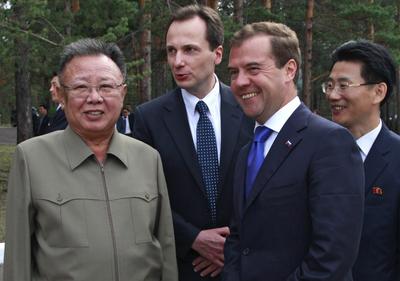Moscow aims to use its economic relations with Asia to enhance economic development and comprehensive security in the Russian Far East. Russia is well placed to contribute toward multilateral security and economic cooperation in Northeast Asia: it is the only country in the region possessing diversified energy resources sufficient to sustain both domestic growth and have considerable export potential.
But most Russian proposals to sell oil, gas and electricity to its neighbours cannot be implemented until issues concerning security on the Korean Peninsula are resolved. Moscow believes this would be greatly facilitated by providing the DPRK with adequate security guarantees and facilitating its socio-economic development in exchange for its renunciation of a military-orientated nuclear program.
According to the Russian President’s official website, over the course of the Ulan-Ude meeting the two leaders discussed bilateral ties in security, politics and economics; regional contacts in trade and the humanitarian sphere; and a full spectrum of security issues on the Korean Peninsula. Medvedev’s Press Secretary, Natalia Timakova, also revealed that Kim expressed readiness to resume the Six-Party Talks without preconditions and, through further negotiations, to decree a moratorium on tests of nuclear armaments and production of nuclear materials. Taking this pledge into account, Medvedev was enthusiastic in announcing that both leaders agreed to form a special commission to develop greater Russia-DPRK cooperation. This would encompass a trilateral project between Russia, North and South Korea, aimed at building a gas pipeline from Russia to South Korea, through DPRK territory.
The meeting was also politically symbolic. Kim’s last official visit took place in 2002. In the following nine years Kim made numerous visits to China, but not to Russia, revealing frustration with Moscow’s attempts to improve relations with key Western countries. But this year, Moscow and Pyongyang showed readiness to strengthen ties — especially the DPRK, which wants to demonstrate to Beijing that China is not its only partner in Northeast Asia.
Also of symbolic value was the agreement to diversify various aspects of bilateral military cooperation, as the two countries decided to commence joint search and rescue exercises in the East Sea by the end of this year. In a sense this is nothing new: the Russian Pacific Fleet regularly conducts annual standard, small-scale joint search and rescue exercises with naval vessels from Japan, the US and other countries. But Pyongyang has consistently protested against the US and South Korea conducting naval exercises close to DPRK borders. North Korea will no longer be excluded from regional joint military exercises, and strengthening the bilateral Moscow-Pyongyang relationship will also help to improve the regional balance of power. Still, Moscow declined Pyongyang’s proposal to arrange a full-size bilateral naval exercise, as well as the sale of Russian armaments to the DPRK.
Significantly, Medvedev demonstrated that Moscow truly supported Pyongyang’s moves to restart the Six-Party Talks. For Russia, North Korea’s eventual denuclearisation is a sensitive issue: in unfavourable wind conditions, for example, radioactive clouds produced by DPRK nuclear tests could quite easily reach Vladivostok. And if anything were to go wrong in the military relationship between the DPRK and ROK, large North Korean refugee flows could cross the Russian border.
Russia also proposed several critically important measures for the provision of energy resources and economic assistance to the DPRK. First, the two leaders discussed terms for cancelling the largest portion of the DPRK’s US$11 billion debt to Russia. Second, from August through to September 2011, Russia supplied North Korea with 50,000 tons of wheat as part of a humanitarian assistance program. Third, Russia declared its readiness to start construction of a gas pipeline to the ROK and to secure a portion of this gas supply for the DPRK — if Pyongyang stops its dangerous activities in the nuclear sphere.
Improved cooperation should ultimately have a positive impact on regional security, meaning that such developments as discussed at the Ulan-Ude meeting could significantly improve the prospects for future negotiations with the DPRK.
Sergei Sevastianov is Director at the International Studies Center, Vladivostok State University of Economics and Service. This article is adapted from one published here by the Jeju Peace Institute under the title ‘Ulan-Ude Summit and Northeast Asia’s Security Perspective’.

